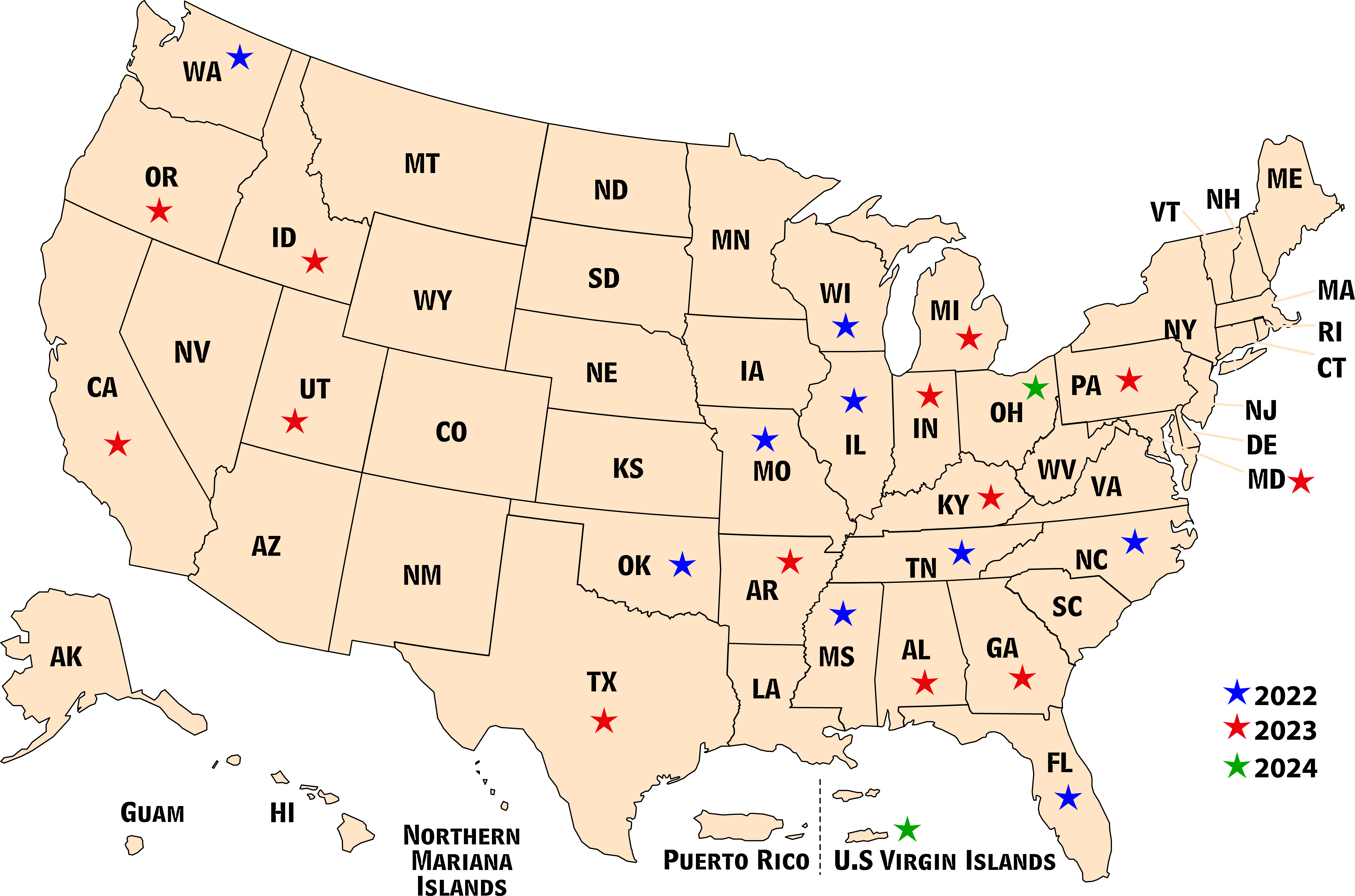About the Project:
Digital access is vital to community wellbeing. Yet many communities and individuals lacking access struggle with navigating the divide. In partnership with Extension Foundation, the Extension Committee on Organization and Policy’s Broadband Program Action Team, USDA National Institute of Food & Agriculture, the National Digital Extension Education Team (NDEET), the Southern Rural Development Center hosted a three-day in-person intensive train-the-trainer workshop for teams of Extension professionals interested in helping pilot a process to close the digital divide in their states.
2024 NDEET Impact Report:
Digital Access Continuum:
Digital access involves multiple, interconnected focus points.
These are depicted below along with roles for Cooperative Extension Service:

Download this Infographic [PDF]]
States Involved

| 2022 Advancing Digital Access Participants | 2023 Advancing Digital Access Participants | 2024 Advancing Digital Access Participants |
 |
 |
 |
About the Curriculum:
- Marc McCarty, Consultant for Broadband Initiatives
- Joe K. Lear, Consultant for Broadband Initiatives
- Alison Copeland, Deputy Chief Engagement Officer
- Monica Babine, retired
- Debra Hansen, County Director and Professor
- Russ Garner, Southern Rural Development Center
- Gail Huycke, University of Wisconsin-Madison Division of Extension
- Stacey McCullough, University of Arkansas System Division of Agriculture-Extension
- Rachel Welborn, Southern Rural Development Center
- Abi Waldrupe
- Kristi Zappie-Ferradino
- • Pamela Rosales
- Gail Huycke, University of Wisconsin-Madison Division of Extension
- Kenneth Sherin, North Carolina State University
- Digital Skill-Building Matrix
- Lessons Links
- Summary of Online Digital Literacy Resources
Digitally Connected Communities: Gives a step-by-step process for communities to develop plans to address broadband access
Digital Navigator: Incorporates the model developed by the National Digital Inclusion Alliance to provide on-the-ground support to individuals or businesses seeking to advance digital access and related skills.
https://www.digitalinclusion.org/digital-navigator-model/
Digital Literacy Tools:
Digital Literacy Toolkit: Provides links to publicly available digital literacy lessons on a variety of topics. These can be used for personal learning, one-on-one assistance, or group lessons.
Working with Diverse Audiences: This lesson gives practical, hands-on experience to guide educators as they work with different audiences who may physical limitations that may hinder learning new digital skills
Cyber Security: This lesson provides a primer on why safety in accessing digital content is important. It also provides some practical exercises to help participants apply the concepts.
Team Members:
Digitally Connected Communites:
University of Missouri System Office of Engagement developed the original material.
Lead Authors:
Supported by:
Washington State University Extension developed the Broadband Action Team initiative which has been incorporated into this national process.
Lead Authors:
National Digital Education Extension Team (NDEET) developed the Broadband Action Team initiative which has been incorporated into this national process.
Contributing Authors:
Digital Navigators:
National Digital Inclusion Alliance (NDIA) developed this initiative.
www.digitalinclusion.org/
Trainers for this workshop include:
Digital Literacy Tools:
Cyber Security — Terrence Wolfork, Fort Valley A&M University
Working with Diverse Audiences
Digital Literacy Toolkit — Anna M. Kleiner, Consultant, Research & Evaluation
Design and Technical Editing:
Carmen Kelly, Southern Rural Development Center
Want to Stay Informed:
Extension professionals can join the Community of Practice on Extension Foundation’s platform: www.connect.extension.org/g/broadband-access-and-digital-skills
For more information, contact Roseanne Scammahorn, r.scammahorn@msstate.edu
Project Funding:
This work is supported in part by a grant to the Southern Rural Development Center through the Extension Foundation’s New Technologies for Ag Extension grant no. NTAE-2021-2138 from the USDA National Institute of Food and Agriculture. Any opinions, findings, conclusions, or recommendations expressed in this publication are those of the author(s) and do not necessarily reflect the view of the U.S. Department of Agriculture.
